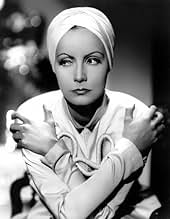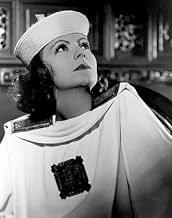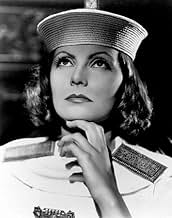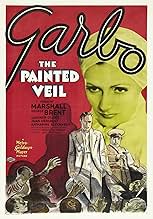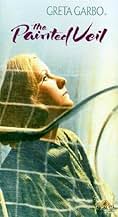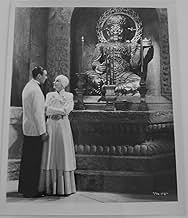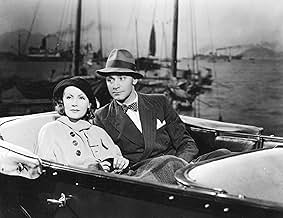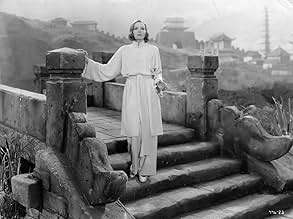NOTE IMDb
6,5/10
1,8 k
MA NOTE
Ajouter une intrigue dans votre langueA wife neglected by her husband, a medical researcher in China, falls in love with a dashing diplomatic attaché.A wife neglected by her husband, a medical researcher in China, falls in love with a dashing diplomatic attaché.A wife neglected by her husband, a medical researcher in China, falls in love with a dashing diplomatic attaché.
- Réalisation
- Scénario
- Casting principal
- Récompenses
- 2 victoires au total
Robert Adair
- Polo Player
- (scènes coupées)
Mariska Aldrich
- German Teacher
- (scènes coupées)
Maidena Armstrong
- German
- (scènes coupées)
Billy Bevan
- Bridegroom
- (scènes coupées)
Beulah Bondi
- Frau Koerber
- (scènes coupées)
W.H. Davis
- German
- (scènes coupées)
Vernon Dent
- Chief of Police
- (scènes coupées)
Avis à la une
Greta Garbo stars with Herbert Marshall, George Brent, Warner Oland, and Jean Hersholt in "The Painted Veil," from 1934, based on the novel by Somerset Maugham. Garbo plays an Austrian woman, Katrin, who grabs at the chance to marry her father's research assistant, Walter Fane (Marshall) after her sister marries and leaves home. At first, they are happy, as Katrin gets to see parts of the world she hasn't seen. Soon, however, she becomes lonely, as Walter is busy fighting a cholera epidemic.
Katrin falls for Jack Townsend (George Brent) from the British embassy, and the two enter into a passionate affair. Walter finds out; then Katrin is humiliated when she realizes that Jack cares more for his reputation than her and does not seem willing to get a divorce. Walter insists that she travel with him as he goes deeper into China to fight the epidemic; she realizes he just wants her to get sick and die.
Garbo is incredible in this film - warm, sweet, and flirtatious in the beginning, and rising to the dramatic challenges later, she gives a beautifully layered, sympathetic, and powerful performance. Marshall is very good, as is the rest of the cast - but Garbo just walks away with the whole thing. A very unusual presence and talent, very passionate and committed. It's such a shame that she didn't pursue opportunities for films in Europe after the war.
Also, the Chinese atmosphere (totally MGM backlot) feels very authentic.
This film ends differently from the 2006 version. Though I liked the 2006 version, it lacks the magic of this one. Magic, spelled G-a-r-b-o.
Katrin falls for Jack Townsend (George Brent) from the British embassy, and the two enter into a passionate affair. Walter finds out; then Katrin is humiliated when she realizes that Jack cares more for his reputation than her and does not seem willing to get a divorce. Walter insists that she travel with him as he goes deeper into China to fight the epidemic; she realizes he just wants her to get sick and die.
Garbo is incredible in this film - warm, sweet, and flirtatious in the beginning, and rising to the dramatic challenges later, she gives a beautifully layered, sympathetic, and powerful performance. Marshall is very good, as is the rest of the cast - but Garbo just walks away with the whole thing. A very unusual presence and talent, very passionate and committed. It's such a shame that she didn't pursue opportunities for films in Europe after the war.
Also, the Chinese atmosphere (totally MGM backlot) feels very authentic.
This film ends differently from the 2006 version. Though I liked the 2006 version, it lacks the magic of this one. Magic, spelled G-a-r-b-o.
This movie is imperfect, but I love it anyway.
Its imperfections:
The soundstage China of 1933's "Bitter Tea of General Yen" leaves the soundstage China of 1934's "Painted Veil" in the dust. "Yen's" China draws you in and intoxicates you. "Painted Veil's" China is fun, but it's a bit silly and superficial. A San Francisco Chinatown Chinese New Year's parade would be more profound.
George Brent is at his worst here. I've never seen him do anything quite like what he does here -- a fly-by-night and exploitative romancer who toys with women's hearts.
Brent wasn't great looking, but he was very good at playing the grounded, reliable foil to electric characters like Bette Davis' Judith Traherne in "Dark Victory."
Here, as Townsend, while speaking serious words, Brent adopts a silly smile, and -- literally -- renounces everything he says in the very next sentence. Maybe a much better looking, or more conventionally handsome, actor could have made this character charming in a snake-like, dangerous way (Erroll Flynn?) but Brent didn't really have the equipment to make Townsend as charming to the audience as he might have been to a neglected wife in China.
Garbo plays a near spinster who watches her younger sister marry, and, on the rebound, marries a man she doesn't love out of desperation.
How on earth could anyone make sense of *Garbo* as a desperate spinster? The movie doesn't even try to make sense of that. It just asks us to believe it. The viewer has to try to make up reasons for her spinster status. (Her parents kept her locked in a closet the first thirty or so years of her life? She had a horrible facial deformaty that suddenly fell off?)
BUT!
I still love this movie.
I love it for the moment when Herbert Marshall says, with the kind of real passion you expect of a contemporary production of a Eugene O'Neill play, that he despises himself for loving Garbo, after she has cuckolded him.
It's great to see Marshall, who so often played helpless men ill used by women ("The Letter," "Duel in the Sun," "The Little Foxes"), here finally able to effectively express his bitterness at being so ill used, and take some action in response, even if that action is intended to be fatal.
I love it for the complications that arise in the final portion. Hearts are changed. Suffering and human sacrifice changes them. Love is born of the kind of big events that sometimes do change people, and life stories, in real life.
This ending, though not in compliance with Maughm's novel, didn't strike me as a "Hollywood" "happy" ending at all. It struck me as a profound ending. It reminded me of a more recent film, Bertolucci's "Besieged," that also talks about the role of altruism in love and eroticism.
For those features, I deeply value this movie, in spite of its superficial imperfections.
Its imperfections:
The soundstage China of 1933's "Bitter Tea of General Yen" leaves the soundstage China of 1934's "Painted Veil" in the dust. "Yen's" China draws you in and intoxicates you. "Painted Veil's" China is fun, but it's a bit silly and superficial. A San Francisco Chinatown Chinese New Year's parade would be more profound.
George Brent is at his worst here. I've never seen him do anything quite like what he does here -- a fly-by-night and exploitative romancer who toys with women's hearts.
Brent wasn't great looking, but he was very good at playing the grounded, reliable foil to electric characters like Bette Davis' Judith Traherne in "Dark Victory."
Here, as Townsend, while speaking serious words, Brent adopts a silly smile, and -- literally -- renounces everything he says in the very next sentence. Maybe a much better looking, or more conventionally handsome, actor could have made this character charming in a snake-like, dangerous way (Erroll Flynn?) but Brent didn't really have the equipment to make Townsend as charming to the audience as he might have been to a neglected wife in China.
Garbo plays a near spinster who watches her younger sister marry, and, on the rebound, marries a man she doesn't love out of desperation.
How on earth could anyone make sense of *Garbo* as a desperate spinster? The movie doesn't even try to make sense of that. It just asks us to believe it. The viewer has to try to make up reasons for her spinster status. (Her parents kept her locked in a closet the first thirty or so years of her life? She had a horrible facial deformaty that suddenly fell off?)
BUT!
I still love this movie.
I love it for the moment when Herbert Marshall says, with the kind of real passion you expect of a contemporary production of a Eugene O'Neill play, that he despises himself for loving Garbo, after she has cuckolded him.
It's great to see Marshall, who so often played helpless men ill used by women ("The Letter," "Duel in the Sun," "The Little Foxes"), here finally able to effectively express his bitterness at being so ill used, and take some action in response, even if that action is intended to be fatal.
I love it for the complications that arise in the final portion. Hearts are changed. Suffering and human sacrifice changes them. Love is born of the kind of big events that sometimes do change people, and life stories, in real life.
This ending, though not in compliance with Maughm's novel, didn't strike me as a "Hollywood" "happy" ending at all. It struck me as a profound ending. It reminded me of a more recent film, Bertolucci's "Besieged," that also talks about the role of altruism in love and eroticism.
For those features, I deeply value this movie, in spite of its superficial imperfections.
When I watched THE PAINTED VEIL, I thought that a remake should be made. Because the story has so much potential which couldn't have been explored sans restrictions in a movie made in the 1930s. Oddly enough, when I watched this film (early spring of 2006), it was announced that a remake of THE PAINTED VEIL was in the works and it's starring Naomi Watts in the role of Katrin. Well, after hearing this bit of news, I guess a good remake has yet to be made because casting Watts in the role played by Garbo is, well, ludicrous.
The best thing about the Garbo version of THE PAINTED VEIL is Garbo herself. She outshines the whole movie. Remove her from the film and, frankly, there's no reason to watch it. Garbo plays a very difficult role and pulls it off successfully. She beautifully underplays her role, which could have easily been fodder for scenery chewing if played by other actresses of that era. Watts has big shoes to fill.
The worst part of this version are two male co-stars, who aside from being almost indistinguishable from each other, are dull. It's hard to believe any woman would be interested in either of them, character or look-wise. And the production values, though good, aren't the most effective. Even though the budget was supposedly high for that time, there's a cheap, rushed feel to it (it was shot in two months!). No location film-making in China here. Another problem is the script which is obviously a truncated version of the W. Somerset Maugham novel. Something tells me big parts of the book were left out and the story in the film looks half complete. But the basis of this odd romance is still there and I find it fascinating. It's sorta like an anti-romance romantic story, or a reversed romantic story, which I've rarely seen before and having Garbo in this was perfect casting, because of she was such an unconventional star.
I rate the movie a 5 but because of Garbo, I give it a 7.
(P.S.: I finally read the book and did not like it at all. The Garbo film is an actual improvement)
The best thing about the Garbo version of THE PAINTED VEIL is Garbo herself. She outshines the whole movie. Remove her from the film and, frankly, there's no reason to watch it. Garbo plays a very difficult role and pulls it off successfully. She beautifully underplays her role, which could have easily been fodder for scenery chewing if played by other actresses of that era. Watts has big shoes to fill.
The worst part of this version are two male co-stars, who aside from being almost indistinguishable from each other, are dull. It's hard to believe any woman would be interested in either of them, character or look-wise. And the production values, though good, aren't the most effective. Even though the budget was supposedly high for that time, there's a cheap, rushed feel to it (it was shot in two months!). No location film-making in China here. Another problem is the script which is obviously a truncated version of the W. Somerset Maugham novel. Something tells me big parts of the book were left out and the story in the film looks half complete. But the basis of this odd romance is still there and I find it fascinating. It's sorta like an anti-romance romantic story, or a reversed romantic story, which I've rarely seen before and having Garbo in this was perfect casting, because of she was such an unconventional star.
I rate the movie a 5 but because of Garbo, I give it a 7.
(P.S.: I finally read the book and did not like it at all. The Garbo film is an actual improvement)
The best adaptation of Maugham may be "The Letter," but this version of "The Painted Veil," which substantially changes his ending, is very nearly as good-- as subtle, as elegant, and as satisfying as a work of art. Both examine the profound differences and similarities that exist between passion and love, but this film goes deeper, looking at the glory that ensues when, at length, love and passion bloom together.
Much credit goes to William Daniels, who was D.P. for directors from Stroheim to Ichikawa to Bud Yorkin. His framing and silvery lighting give even greater weight to the superb performances by Garbo and the masterful Herbert Marshall. Together Daniels and director Boleslawski allow the two actors to deliver the very affecting and very adult dialog with rare dignity and feeling.
The two kitchen scenes in particular, one in the first sequence, and one near the end, are flawless, and all the better because of being parallels, and because the dialog employs the sheer force of elemental simplicity. In the second scene,when cholera-fighting Marshall finally speaks of his wife's infidelity, he humbly takes some of the blame, saying, "I went blind a little mad. But if all the men who were hurt simply quit — bad business." Garbo at last begins to understand and replies, "Being in love, and letting it smash things as I have, I thought it had the right of way, I really did." She finally realizes that passion, such as hers for her lover, can be both deeply felt and utterly shallow.
One more note about the visual genius on display. A standard cliché, fireworks,is used to suggest orgasm, but it is done as brilliantly and thrillingly as I've ever seen: three or four bursts of sparks shoot into the frame, like nothing so much as ejaculation.
Much credit goes to William Daniels, who was D.P. for directors from Stroheim to Ichikawa to Bud Yorkin. His framing and silvery lighting give even greater weight to the superb performances by Garbo and the masterful Herbert Marshall. Together Daniels and director Boleslawski allow the two actors to deliver the very affecting and very adult dialog with rare dignity and feeling.
The two kitchen scenes in particular, one in the first sequence, and one near the end, are flawless, and all the better because of being parallels, and because the dialog employs the sheer force of elemental simplicity. In the second scene,when cholera-fighting Marshall finally speaks of his wife's infidelity, he humbly takes some of the blame, saying, "I went blind a little mad. But if all the men who were hurt simply quit — bad business." Garbo at last begins to understand and replies, "Being in love, and letting it smash things as I have, I thought it had the right of way, I really did." She finally realizes that passion, such as hers for her lover, can be both deeply felt and utterly shallow.
One more note about the visual genius on display. A standard cliché, fireworks,is used to suggest orgasm, but it is done as brilliantly and thrillingly as I've ever seen: three or four bursts of sparks shoot into the frame, like nothing so much as ejaculation.
Married to a distracted English scientist, a beautiful Austrian finds forbidden love beyond THE PAINTED VEIL in China.
Based on a story by W. Somerset Maugham, this MGM film is soap opera of a high order, featuring excellent production values & acting. The dialogue is also refreshingly literate & thoughtful, something of a surprise in a film which might be pigeonholed as just an elaborate potboiler.
Fascinating as always, Greta Garbo is at last showcased in a film whose backdrop & setting matches her for exoticism. Enervated by the overwhelming cultural saturation of pre-war China, she seems freed to be essentially herself - shorn of all needs to bewitch - and is able to give herself over to the seriousness & drama of her character's dilemma. What the viewer is left with is one of her best performances.
The two men in Garbo's life are excellently portrayed by Herbert Marshall & George Brent. Neither characters are without faults, but the actors make them intimately human, revealing some of the loneliness in each man's heart. These actors had distinct similarities, making it something of a bold move for MGM to put them in the same film, but also enabling the viewer to understand why Garbo could love both.
Excellent support is given by gentle Jean Hersholt as Garbo's kindly father; Forrester Harvey as a happy-go-lucky embassy employee in China & Warner Oland as a sympathetic Chinese general.
Movie mavens will recognize Keye Luke as a young doctor and Mary Forbes & Ethel Griffies as British ladies in Hong Kong - all uncredited.
The Chinese scenes show MGM at what it did best - creating another world, utterly realistic, in its back lot.
Based on a story by W. Somerset Maugham, this MGM film is soap opera of a high order, featuring excellent production values & acting. The dialogue is also refreshingly literate & thoughtful, something of a surprise in a film which might be pigeonholed as just an elaborate potboiler.
Fascinating as always, Greta Garbo is at last showcased in a film whose backdrop & setting matches her for exoticism. Enervated by the overwhelming cultural saturation of pre-war China, she seems freed to be essentially herself - shorn of all needs to bewitch - and is able to give herself over to the seriousness & drama of her character's dilemma. What the viewer is left with is one of her best performances.
The two men in Garbo's life are excellently portrayed by Herbert Marshall & George Brent. Neither characters are without faults, but the actors make them intimately human, revealing some of the loneliness in each man's heart. These actors had distinct similarities, making it something of a bold move for MGM to put them in the same film, but also enabling the viewer to understand why Garbo could love both.
Excellent support is given by gentle Jean Hersholt as Garbo's kindly father; Forrester Harvey as a happy-go-lucky embassy employee in China & Warner Oland as a sympathetic Chinese general.
Movie mavens will recognize Keye Luke as a young doctor and Mary Forbes & Ethel Griffies as British ladies in Hong Kong - all uncredited.
The Chinese scenes show MGM at what it did best - creating another world, utterly realistic, in its back lot.
Le saviez-vous
- AnecdotesLa reine Christine (1933) and Le Voile des illusions (1934) were both huge hits in Europe (making twice their budget in the UK alone), but were underwhelming US successes.
- GaffesA box is marked "Scotch Whiskey", which is the American spelling of whiskey. In the United Kingdom, however, it is spelled with no 'e' and is simply "whisky". Therefore, had the whisk(e)y been imported directly from Scotland, it should have had the 'whisky' spelling.
- Citations
Katrin Koerber Fane: [after Townsend impulsively kisses Katrin] How could you?
Jack Townsend: I could.
- Crédits fousGreta Garbo's name in the opening credits uses a font that forms the same Gothic arch in the letters as is used in W. Somerset Maugham's symbol. The other credits also use this to a lesser extent.
- ConnexionsFeatured in La terre chinoise (1937)
- Bandes originalesBridal Chorus (Here Comes the Bride)
(1850) (uncredited)
from "Lohengrin"
Written by Richard Wagner
Played as background music in the wedding scene
Meilleurs choix
Connectez-vous pour évaluer et suivre la liste de favoris afin de recevoir des recommandations personnalisées
- How long is The Painted Veil?Alimenté par Alexa
Détails
- Date de sortie
- Pays d’origine
- Langues
- Aussi connu sous le nom de
- The Painted Veil
- Lieux de tournage
- Chine(background shots)
- Société de production
- Voir plus de crédits d'entreprise sur IMDbPro
Box-office
- Budget
- 947 000 $US (estimé)
- Durée1 heure 25 minutes
- Couleur
- Rapport de forme
- 1.37 : 1
Contribuer à cette page
Suggérer une modification ou ajouter du contenu manquant

Lacune principale
By what name was Le Voile des illusions (1934) officially released in India in English?
Répondre
